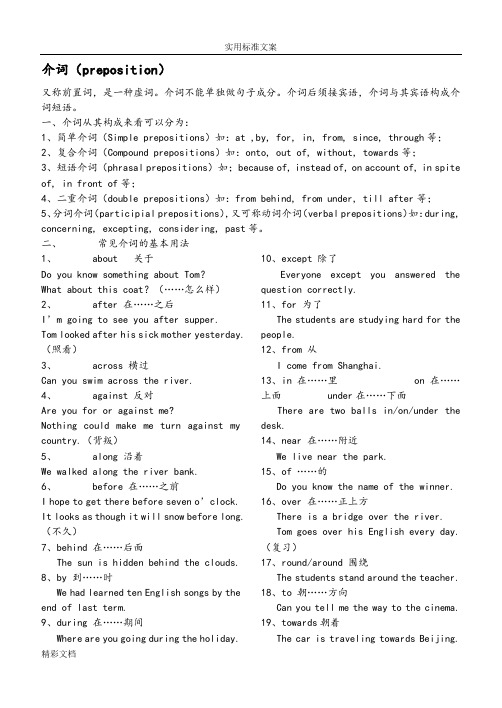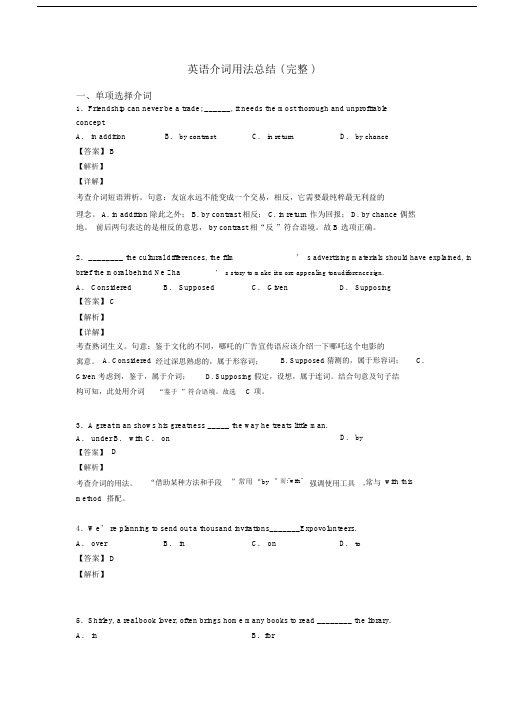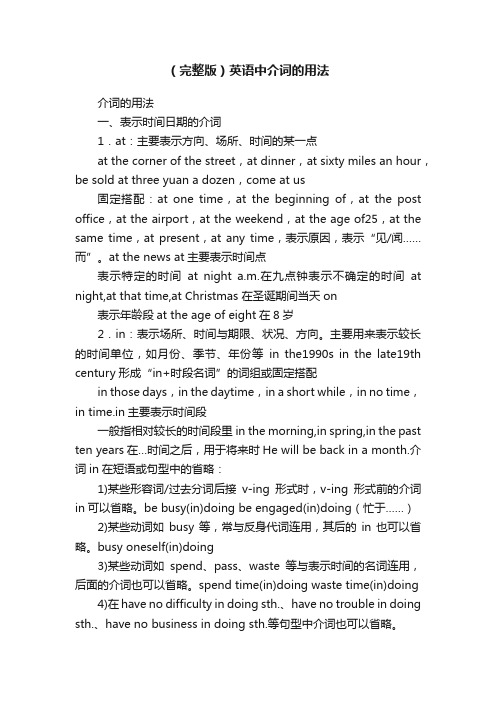完整初中英语介词用法.docx
(完整版)初中英语介词用法大全,推荐文档

6 表示能力擅长于…固定考点:be good at;be bad at;an expertatHe is good at drawing(at 后接名词或动名词)初中阶段应掌握In 的常见短语介词短语at first 首先,开始时;at last;at most;at least 至少;at all events 无论如何;at home 在家,无拘束;at a loss 不知怎办;at any rate 不管怎样;at length 详细地;be at high tide 处于高潮期;at ourinvitation 应我们的邀请;at our request 应我们的请求;at the news 听到这消息;at the risk of冒……危险;at a great expense 以巨大费用;at intervals of 每隔;at the sight of 一见到 at thepoint of 接近,靠近;at the thought of 一想到;at the speed of 以……速度;at the cost (price) of以……为代价;at leisure 闲着、失业;at stake 在危险中、在成败关头;at bottom 实际上、本质上;atshort notice 一得到通知;at seeing us 看到我们;at the present stage 在现阶段;at the weekend 周末;at all times 永远;动词短语call at 访问(某地);come at 袭击,攻击; get at 意指,本意是;理解;到达; knock at 敲打(门窗),敲击; look at 看; work at 从事, 致力于, 钻研; laugh at 嘲笑;glare at 怒目而视; glance at 匆匆一瞥;point at 指向6.across 动词短语go about 着手,四处走走;set about 着手,开始;worry about 为…担心; come about 发生;care about 关心、在意;bring about 引起,带来,导致;knock about 漫游;look about 四处看看,四处环顾;set about doing 着手做,开始;turn about 向后转;think about 考虑(是否去做);argue about 争论; know about 了解;hear about 听说;askabout 询问;chat about 闲聊;quarrel about 争吵;speak/talk about 谈论;complain about 报怨备注-among 与between 的区别:三者与两者之间的区别。
(完整word版)介词用法归纳,推荐文档

介词(preposition)又称前置词,是一种虚词。
介词不能单独做句子成分。
介词后须接宾语,介词与其宾语构成介词短语。
一、介词从其构成来看可以分为:1、简单介词(Simple prepositions)如:at ,by, for, in, from, since, through等;2、复合介词(Compound prepositions)如:onto, out of, without, towards等;3、短语介词(phrasal prepositions)如;because of, instead of, on account of, in spite of, in front of等;4、二重介词(double prepositions)如:from behind, from under, till after等;5、分词介词(participial prepositions),又可称动词介词(verbal prepositions)如:during, concerning, excepting, considering, past等。
二、常见介词的基本用法1、 about 关于Do you know something about Tom?What about this coat?(……怎么样)2、 after 在……之后I’m going to see you after supper. Tom looked after his sick mother yesterday.(照看)3、 across 横过Can you swim across the river.4、 against 反对Are you for or against me?Nothing could make me turn against my country.(背叛)5、 along 沿着We walked along the river bank.6、 before 在……之前I hope to get there before seven o’clock. It looks as though it will snow before long.(不久)7、behind 在……后面The sun is hidden behind the clouds.8、by 到……时We had learned ten English songs by the end of last term.9、during 在……期间Where are you going during the holiday. 10、except 除了Everyone except you answered the question correctly.11、for 为了The students are studying hard for the people.12、from 从I come from Shanghai.13、in 在……里 on 在……上面 under在……下面There are two balls in/on/under the desk.14、near 在……附近We live near the park.15、of ……的Do you know the name of the winner.16、over 在……正上方There is a bridge over the river.Tom goes over his English every day.(复习)17、round/around 围绕The students stand around the teacher.18、to 朝……方向Can you tell me the way to the cinema.19、towards朝着The car is traveling towards Beijing.20、with 和……一起me?Would you like to go to the cinema with学习这些介词时可以先记住它的汉语意思,然后参照例句来加深理解,并在今后的学习中加以灵活运用。
(完整)七年级介词用法

一、表示时间和日期的介词at表示某一时刻或时间上的某一点on表示某一天,某一天的上午、下午或晚上in表示年、季节、月份、周,或泛指上午、下午或晚上;二、表示方位的介词on意为“在……的上面”;over意为“在……(垂直)的正上方”;above意为“在……(不一定垂直)的上方”;under意为“在……(垂直的)正下方”;below意为“在……(不一定垂直)的下方”;near意为“在……附近”;next to意为“紧挨着……”;round / around 意为“在……周围”;by意为“在……旁边”;表示两者的位置关系时in表示“在同一区域内或同一范围内”;on表示“接壤;相邻”;to表示“相离;相隔”,两者不属同一范围,也不接壤。
三、表示延续时间的介词by意为“在……之前;不迟于……”;for意为“历时……之久;持续……”;in意为“在……以后;在……时间内”;since意为“自从……以来;自……以后”;until 用于否定句中,意为“直到……才”,其前的谓语动词多为非延续性动词,用在肯定句中,意为“直到……为止”,其前谓语动词须用延续性动词。
如:他已经当老师9年了。
He has been a teacher ________ nine years. 我已经在这儿住了10年了。
I have lived here ________ ten years ago.他十分钟之后将会回来。
He will be back ________ ten minutes.知道五月,我们才会看到一些花。
We don’t see any flowers ________ May.你必须得在这里站到太阳落下去为止。
You must stand here ________ the sun sets. 我明天早晨八点前必须得到校。
I must be at school ________ eight tomorrowmorning.你能在五分钟之内干完这些工作吗?Can you finish your work _______ five minutes?四、表示方式的介词介词用来表交通,常把by, in, on来用;限定、复数用in / on,by要直通海陆空;(骑马、骑车惯用on,小轿车前in才通)【注】1. by + 交通工具,意为“乘坐……”。
初一知识点解析介词用法详解

初一知识点解析介词用法详解一、介词的定义及功能介词是英语中一种重要的词类,用来表示名词与名词、名词与动词、名词与形容词之间的关系。
它常常位于名词前面,用来修饰名词或者说明事物的位置、方向、时间等。
二、介词的分类1. 表示位置关系的介词:on、in、under、above、below、inside、outside等。
例句:- The book is on the desk.(书在桌子上。
)- The cat is under the table.(猫在桌子下面。
)2. 表示时间关系的介词:at、in、on、before、after、during等。
例句:- I will meet you at 7 o'clock.(我会在7点钟见你。
)- We will go to the cinema on Sunday.(我们将在星期天去电影院。
)3. 表示方向关系的介词:to、from、over、across、through等。
例句:- He ran to the park.(他跑向公园。
)- We walked across the bridge.(我们走过桥。
)4. 表示方式、原因的介词:with、without、by、for等。
例句:- She writes with a pen.(她用钢笔写。
)- They came by train.(他们坐火车来。
)三、常用介词短语1. in front of:在...前面例句:- The cat is sitting in front of the door.(猫正坐在门前。
)2. at the back of:在...后面例句:- There is a garden at the back of the house.(屋后有一个花园。
)3. in the middle of:在...中间例句:- The tree is in the middle of the park.(这棵树在公园中间。
初一英语常见介词用法归纳

初一英语常见介词用法归纳1. 引言1.1 初一英语介词的定义Introduction:Prepositions are essential parts of speech in the English language. They are words that show the relationship between a noun or pronoun and other words in a sentence. Prepositions are used to indicate location, time, direction, or possession.1.2 介词在句子中的作用In a sentence, prepositions function to show the relationship between the noun or pronoun that follows them and other words in the sentence. They indicate location, direction, time, manner, or possession. Prepositions are essential for conveying clear and precise meaning in English sentences.2. 正文2.1 常见的初一英语介词在初一英语学习中,介词是一个非常重要的语法成分。
介词通常位于名词、代词或动词前面,用来表示名词、代词或动词与其他词之间的关系。
在初一阶段的英语学习中,孩子们需要掌握一些常见的英语介词,以便正确地构建句子和表达自己的意思。
1. In(在…里面)- I have a book in my bag.(我书包里有一本书。
)- There is a cat in the box.(盒子里有一只猫。
)这些是初一阶段常见的英语介词,掌握它们的用法可以帮助孩子们更准确地表达自己的意思,构建正确的句子。
英语介词用法总结(完整).docx

英语介词用法总结 ( 完整 )一、单项选择介词1.Friendship can never be a trade; ______, it needs the most thorough and unprofitableconcept.B. by contrast C. in return D. by chanceA. in addition【答案】 B【解析】【详解】考查介词短语辨析。
句意:友谊永远不能变成一个交易,相反,它需要最纯粹最无利益的理念。
A. in addition 除此之外; B. by contrast 相反; C. in return 作为回报; D. by chance 偶然地。
前后两句表达的是相反的意思, by contrast 相“反”符合语境。
故 B 选项正确。
2.________ the cultural differences, the film’ s advertising materials should have explained, in brief the moral behind Ne Zha’ s story to make it more appealing toaudifor e ncesign.A. Considered B. Supposed C. Given D. Supposing【答案】 C【解析】【详解】考查熟词生义。
句意:鉴于文化的不同,哪吒的广告宣传语应该介绍一下哪吒这个电影的寓意。
A. Considered经过深思熟虑的,属于形容词; B. Supposed 猜测的,属于形容词; C.Given 考虑到,鉴于,属于介词; D. Supposing 假定,设想,属于连词。
结合句意及句子结构可知,此处用介词“鉴于”符合语境。
故选 C 项。
3.A great man shows his greatness _____ the way he treats little man.A. under B. with C. on D. by【答案】D【解析】考查介词的用法。
(word完整版)初中英语介词用法全

初中阶段介词用法汇编※一、表示时间的介词:1、at、on、in“at时间点,有on必有天,in指月季年,也和色相连”就是说,有具体的时间点的时候用at,具体那一天用on,说到月份,季节,年份,就用in ;而且说谁穿了什么颜色的衣服的时候,也是用in XX(color)】at用于某一具体时刻或重大节日之前①在五点钟______②在中午________③在夜晚________④在圣诞节________⑤在午夜_________【答案】①at five o’clock ②at noon ③at night ④at Christmas ⑤at midnight(2)on用在具体某一天或某天的上午、下午、晚上之前①在国庆节_________②在周二晚上_________③在星期天_________【答案】①on National Day ②on Tuesday evening ③on Sunday(3)in用在周、日、季节或泛指的上午、下午、晚上前①在一周内_________②在五月_________③在夏季_________④在2009年_________⑤在下午_________ 【答案】①in a week ②in may ③in summer ④in 2009 ⑤in the afternoon归纳总结在初中阶段常见的固定短语in English用英语 in a minute一会儿、立刻 in a short while一会儿、不久in a hurry匆匆忙忙 in danger在危险中 in full全部地、详细地in a word一句话 in all总共 in every case不管怎样in the end最后 in spite of尽管 in person亲自in fact事实上 in good health身体健康的 in front of在……前面in some ways在某些方面 in common共同的 in public当众☆考题再现:---Who was the first man with A(h1n1) flu in mainland China know for sure?---________May 11,2009.A InB OnC ForD Since【答案】B 【解析】在具体的某一天用on2、before、afterbefore表示“在某时刻或某件事之前”,after用在时刻或某件事之后。
(完整版)英语中介词的用法

(完整版)英语中介词的用法介词的用法一、表示时间日期的介词1.at:主要表示方向、场所、时间的某一点at the corner of the street,at dinner,at sixty miles an hour,be sold at three yuan a dozen,come at us固定搭配:at one time,at the beginning of,at the post office,at the airport,at the weekend,at the age of25,at the same time,at present,at any time,表示原因,表示“见/闻……而”。
at the news at主要表示时间点表示特定的时间at night a.m.在九点钟表示不确定的时间at night,at that time,at Christmas 在圣诞期间当天on表示年龄段at the age of eight在8岁2.in:表示场所、时间与期限、状况、方向。
主要用来表示较长的时间单位,如月份、季节、年份等in the1990s in the late19th century形成“in+时段名词”的词组或固定搭配in those days,in the daytime,in a short while,in no time,in time.in主要表示时间段一般指相对较长的时间段里in the morning,in spring,in the past ten years在…时间之后,用于将来时He will be back in a month.介词in在短语或句型中的省略:1)某些形容词/过去分词后接v-ing形式时,v-ing形式前的介词in可以省略。
be busy(in)doing be engaged(in)doing(忙于……)2)某些动词如busy等,常与反身代词连用,其后的in也可以省略。
- 1、下载文档前请自行甄别文档内容的完整性,平台不提供额外的编辑、内容补充、找答案等附加服务。
- 2、"仅部分预览"的文档,不可在线预览部分如存在完整性等问题,可反馈申请退款(可完整预览的文档不适用该条件!)。
- 3、如文档侵犯您的权益,请联系客服反馈,我们会尽快为您处理(人工客服工作时间:9:00-18:30)。
量子场女生英语承诺中考115 分、高考 120 分初中英语介词的用法一、介词按其构成可分为:1.简单介词 at, in, on, to, since, until等。
如:He's worked there since 1998.2.复合介词 into, onto, out of等。
如:She is out of school.她毕业了。
3.二重介词 from under, from behind, from out of, until after, except in等。
如:I'm from out of town.我是从城外来的。
4.短语介词 because of, instead of, in spite of等。
如:I went back not because of the rain, but because I was tired.我回去不是因为下雨,而是因为我累了。
二、介词的作用:1.表示地点:after, along, at, below, by, of, near, over, through, under等。
如:Near the village the boys are skating on the ice.男孩子们正在村子附近的冰上滑冰。
They lay down under the shade of a tree.他们躺在一棵树的树阴下。
2.表示时间:about, after, across, at, during, for, in, of, till, until等。
如:After class he will tell us about the accident.课后他将告诉我们有关事故的情况。
A heavy rain has been falling across three days.一场大雨下了整整三天。
The accident happened during the night.事故发生在夜间。
3.表示动作:at, across, around, on, over, under等。
如:The earth goes around the sun.地球绕太阳运行。
The car is under repair.汽车在修理中。
4.表示比较: as, like, above, over, with等。
如:She was something like her sister.她有几份像她的妹妹。
Chinese is much more difficult in contrast with English.和英语相比,汉语难得多。
5.表示原因: about, for, from, with等。
如:Don't worry about my lessons.不要担心我的功课。
Business kept me from coming.我因事不能来。
He was angry with what I did.他对我所做的很气愤。
6.表示条件: to, with, without等。
如:Without your advice, he would have failed.没有你的忠告他可能已经失败了。
7.表示手段、方式: as, by, in, with等。
如:He behaved as a drunkard.他的举止如同醉汉一样。
Learn the new words by heart.记住这些生词。
We see with our eyes.我们用眼睛看。
8.表示距离、数量: from, in, within等。
如:My house is ten miles from the school.我家离学校十英里。
They were thirty in all.他们总共有三十人。
9.表示目的: as, for等。
如:I only said it as a joke.我只是把它当作笑的。
It's time for class.到上的了。
10.表示步:for, with等。
如:For all his effort, he didn't succeed.然他做了一番努力,仍不能成功。
With all his money, he is unhappy.尽管他有,但他并不快。
for可以引插入,例如:I, for one, shall vote against the proposal.我也投票反个提。
介的用法一1.与形容搭配的有:be afraid of(怕 )be angry with(生某人的气 )be away from(不在某地 )be different from(与⋯⋯不同 )be good at( 善于 )be good/ bad for (⋯⋯有益 / 有害 )be interested in(⋯⋯感趣 )be late for(到 )be/get ready for(作好准 )be sure of (⋯⋯有把握 )be worried about(⋯⋯感到担 )2.介后常用人称代格和-ing形式1)You must take good care of her.2)Thank you for teaching us so well.3.几易混淆的介A.“在⋯⋯之后”in +一段(用于一般将来)after +一段(用于一般去)after +一点(常用于一般将来)如:The baby stopped crying after half an hour.The baby will stop crying in half an hour.They will visit their teacher after Friday.B. for +一段since +去的一点两者均用于在完成,具体在部分,我会向同学解。
C. be made of“用⋯⋯制成”be made in“由某地制造”be made by somebody “由某人制成”D. in , on, at表in表示“在某月(季、年等)”如: in 1996, in January, in summer固定: in the morning, in a week, in a minute, in time, in the end on用于指具体的某一天或指某一天上午、下午或晚上等。
如: on Christmas Day, on the night of February 16at用于具体刻前和某些固定中。
固定: at seven, at the moment, at night, at last, at first,at noon, at times, at once, at this time of the year, at the beginning of, at the end of this month,at the same time。
注意:在表里,下列情况下一般不用介。
里有:next, last, this, that, tomorrow, yesterday, one, every, all以及the day before yesterday和the day after tomorrow前不用介。
如:不能in tomorrow ,只能tomorrow(在明天)E. except +格/doing something“除⋯⋯之外” (不包括本身)Everyone is at school today except Lin Tao. (同句)= Only Lin Tao isn't at school today.F. “用”交通工具by plane用言 in English通媒介on/ over the telephone, on/ over the radio, on TV用工具手段with a pen, with one's handsG. between “在⋯⋯和⋯⋯ ( 两者) 之”between ⋯ and ⋯,between the two⋯among 在⋯⋯之 ( 三者或三者以上)英常用介的用法1) at, in ,on, over, under(a) at 在⋯⋯“at +N / ( place )” 的基本意在于表达空或位置的点的概念。
例: Thereis a ball at the foot of the desk.(在桌的桌腿那里有一个球。
)就我日常生活的活来看,如下面各短所指的所都属于点的概念。
at home在家at work在工作所,(外出工作)不在家at the door/ window在/窗口at the office在公室at school在学校at ( the ) university在大学at the bus stop在公共汽站at the station在站at the crossroads在十字路口at the bridge在at the next corner在下一个街角at the baker's在面包店at No . 36, Park Street公园街36 号at the party在宴会中at a meeting在会at the club在会at one's desk在自己的桌at ( [ 美 ]the )table在餐桌;在吃at the bottom of⋯在⋯⋯的底部at the foot of⋯在⋯⋯的脚at the end of⋯在⋯⋯的末端 / 尽at the center of⋯在⋯⋯的中央注:注意下面两句的区:I met her in the station.(我在站里遇她。
—station指建筑物)I met her at the station.(我在站遇她。
— station 指交通上的点,遇她的地方有可能在站里面,也可能在站外面。
)(b) in 在⋯⋯里面 / 之中“in + N / ( place )”的基本意是表示在面或空的范里面。
例: Mywatch is in the drawer of my desk.(我的手表在我的桌抽里面。
)可用“ in⋯”来表达的所、地点、位置、空等可以如下:in +洲名、国名、地区名、州/ 省⋯⋯区域名、城市、村名等。
in Asia在洲in China/ the United States在中国 / 美国in Siberia / the West在西伯利 / 西部in California/ Fu Jian在加州 / 福建省in the southern part of Taiwan在台湾南部in London/ Beijing在敦 / 北京in town/ the country在上 / 下in +日常生活所in the street在街道中in the park在公园里in the woods/ trees在林里in the field在田野里in the garden在花园里in the campus在校园里in the library在里in the office在公室里in the gym在体育里in +三空in the sky在天空in the sun在太阳光下in the rain/ snow在雨/雪中in the dark在黑暗中in the ocean/ sea在海洋中in the river/ pool在河 / 游泳池里in the building/ house在建筑物 / 屋里in +容器in the / a box / bag在盒/袋里in the bottle在瓶子里in the drawer在抽里in the basket在子里in the pocket在衣袋里其他in his book在他的中in the newspaper在上her poems在她的中in that story在那故事中in your report在你的告中in the middle of在⋯⋯的中央;在⋯⋯当中in the center of在⋯⋯的中央in the corner of在⋯⋯的角落里注: in the corner of(内角)on the corner of(外角)at the corner of(交叉角)例: There is a wastebasket in the left back corner of the classroom.(教室后面的左角有。
